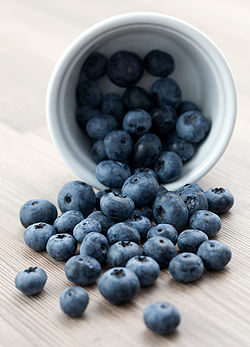Difference between revisions of "Bilberry"
From Wikiwel
(→The benefits of Bilberry are) |
|||
| Line 13: | Line 13: | ||
*The anthocyanins in bilberry may strengthen the walls of blood vessels, reduce inflammation and stabilize tissues containing collagen, such as cartilage, tendons and ligaments. Grape seed contains similar substances, however, bilberry's anthocyanins are thought to have particular benefits for the eye. | *The anthocyanins in bilberry may strengthen the walls of blood vessels, reduce inflammation and stabilize tissues containing collagen, such as cartilage, tendons and ligaments. Grape seed contains similar substances, however, bilberry's anthocyanins are thought to have particular benefits for the eye. | ||
*Because bilberry is thought to strengthen blood vessels, it's sometimes taken orally for varicose veins and hemorrhoids. | *Because bilberry is thought to strengthen blood vessels, it's sometimes taken orally for varicose veins and hemorrhoids. | ||
| + | * Preventing Cancer : Bilberries are a good source of [[Cyanidin]]. | ||
[[Category:Treatments]] | [[Category:Treatments]] | ||
[[Category:fruit & vegetables]] | [[Category:fruit & vegetables]] | ||
Revision as of 02:31, 11 July 2013
Other Names: Airelle, Arándano, Bilberry Fruit, Bilberry Leaf, Black Whortles, Bleaberry, Brimbelle, Burren Myrtle, Dwarf Bilberry, Dyeberry, European Bilberry, Feuille de Myrtille, Fruit de Myrtille, Gueule Noire, Huckleberry, Hurtleberry, Mauret, Myrtille, Myrtille Européenne, Myrtilli Fructus, Raisin des Bois, Swedish Bilberry, Trackleberry, Vaccinium myrtillus, Whortleberry, Wineberry.
Bilberry fruit is a close relative to the American blueberry. It's a common ingredient in pies, cakes and jams. The active constituents are thought to be antioxidants called anthocyanins.
Special Precautions of Bilberry
- The dried, ripe fruit of bilberry is LIKELY SAFE for most people when eaten in typical food amounts. Bilberry fruit products, such as powders or extracts, also seem to be safe for most people.
- Bilberry leaf is POSSIBLY UNSAFE for most people when taken in high doses or for a long time. If you have diabetes, keep in mind that bilberry leaf might lower blood sugar. Monitor your blood sugar closely.
- Pregnancy or breast-feeding: Not enough is known about the use of bilberry during pregnancy and breast-feeding. Stay on the safe side and avoid use.
- Surgery: Bilberry might affect blood glucose levels. This could interfere with blood sugar control during and after surgery. Stop taking bilberry at least two weeks before a scheduled surgery.
- Medications for diabetes (Antidiabetes drugs) interacts with BILBERRY
- Medications that slow blood clotting (Anticoagulant / Antiplatelet drugs) interacts with BILBERRY
The benefits of Bilberry are
- Bilberry is primarily used for eye conditions and to strengthen blood vessels. During World War II, British Royal Air Force pilots reportedly found that eating bilberry jam just before a mission improved their night vision which prompted researchers to investigate bilberry's properties.
- Bilberry is also used for glaucoma, macular degeneration, diabetic retinopathy and cataracts.
- The anthocyanins in bilberry may strengthen the walls of blood vessels, reduce inflammation and stabilize tissues containing collagen, such as cartilage, tendons and ligaments. Grape seed contains similar substances, however, bilberry's anthocyanins are thought to have particular benefits for the eye.
- Because bilberry is thought to strengthen blood vessels, it's sometimes taken orally for varicose veins and hemorrhoids.
- Preventing Cancer : Bilberries are a good source of Cyanidin.
